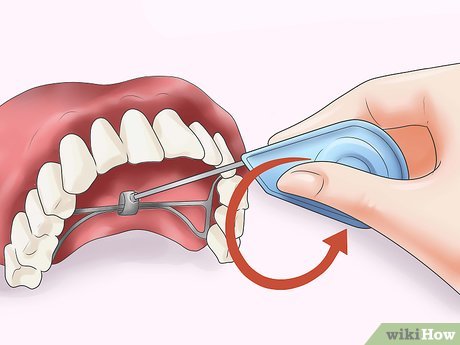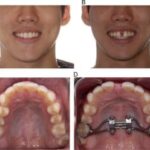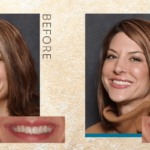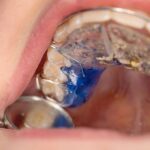2. Cut food into smaller pieces: To make eating more manageable, cut your food into smaller, bite-sized pieces. This will make it easier to chew and reduce the risk of getting food stuck in the expander. Take your time and chew slowly to avoid any unnecessary discomfort.
4. Avoid hard or sticky candies: While it may be tempting to indulge in your favorite candies, it’s best to avoid hard or sticky ones when you have an expander. These types of candies can damage the expander or get stuck, causing discomfort and potentially prolonging the treatment process.
5. Stay hydrated: Drinking plenty of water throughout the day can help keep your mouth moist and make eating with an expander more comfortable. Dry mouth can exacerbate any discomfort, so make sure to stay hydrated and sip water regularly.
Adjusting to the Expander

When you first get an expander, it can feel strange and uncomfortable in your mouth. It may take some time to adjust to the new appliance, but with a few tips and tricks, you can make the process easier.
1. Take it slow
Don’t rush into eating hard or chewy foods right away. Start with soft foods that require minimal chewing, such as mashed potatoes, yogurt, or soup. As you become more comfortable with the expander, gradually introduce harder foods into your diet.
2. Cut food into small pieces

To make chewing easier, cut your food into small, bite-sized pieces. This will reduce the amount of pressure on your teeth and make it easier to navigate around the expander.
3. Avoid sticky or hard foods
During the adjustment period, it’s best to avoid sticky or hard foods that can get stuck in the expander or put excessive pressure on your teeth. Examples of foods to avoid include caramel, taffy, popcorn, and hard candies.
4. Opt for softer alternatives
If you’re craving something crunchy, try opting for softer alternatives. For example, instead of eating raw carrots, try steaming or boiling them until they are softer and easier to chew.
5. Drink plenty of water
Drinking water throughout the day can help keep your mouth hydrated and reduce discomfort caused by the expander. It can also help flush out any food particles that may get stuck in the appliance.
6. Use over-the-counter pain relievers
If you experience any discomfort or soreness from the expander, you can try using over-the-counter pain relievers, such as ibuprofen or acetaminophen. However, always consult with your orthodontist or dentist before taking any medication.
7. Follow your orthodontist’s instructions
Adjusting to an expander may take some time, but with patience and the right techniques, you can make the process smoother. Remember to consult with your orthodontist if you have any concerns or questions about your expander or its adjustment period.
Choosing the Right Foods
1. Soft Foods
Opt for soft foods that require minimal chewing, especially in the first few days after getting your expander. This can include mashed potatoes, yogurt, smoothies, soups, and cooked vegetables.
2. Cut Food into Small Pieces
If you want to eat harder foods, such as fruits or vegetables, make sure to cut them into small, bite-sized pieces. This will make it easier to chew and reduce the strain on your expander.
3. Avoid Sticky Foods
Sticky foods, like caramel or chewing gum, can get stuck in your expander and make it difficult to clean. It’s best to avoid these types of foods until your treatment is complete.
4. Chew Slowly and Carefully
When chewing, take your time and be mindful of your expander. Avoid biting down too hard or using excessive force, as this can damage the appliance. Chew slowly and carefully to prevent any discomfort or complications.
5. Stay Hydrated
Drinking plenty of water throughout the day can help keep your mouth lubricated and make it easier to chew. It can also help flush out any food particles that may get trapped in your expander.
Remember to always follow your orthodontist’s guidelines and recommendations for eating with an expander. They will provide you with specific instructions based on your individual treatment plan. If you have any concerns or questions, don’t hesitate to seek professional advice.
Chewing Techniques
When you have an expander, it can be challenging to chew and eat certain foods. However, with the right techniques, you can still enjoy a variety of foods while managing any discomfort. Here are some tips for chewing with an expander:
1. Take small bites
Instead of taking large bites, try to take smaller, more manageable bites. This will help you chew your food more easily and reduce any strain on your expander.
2. Chew slowly and thoroughly
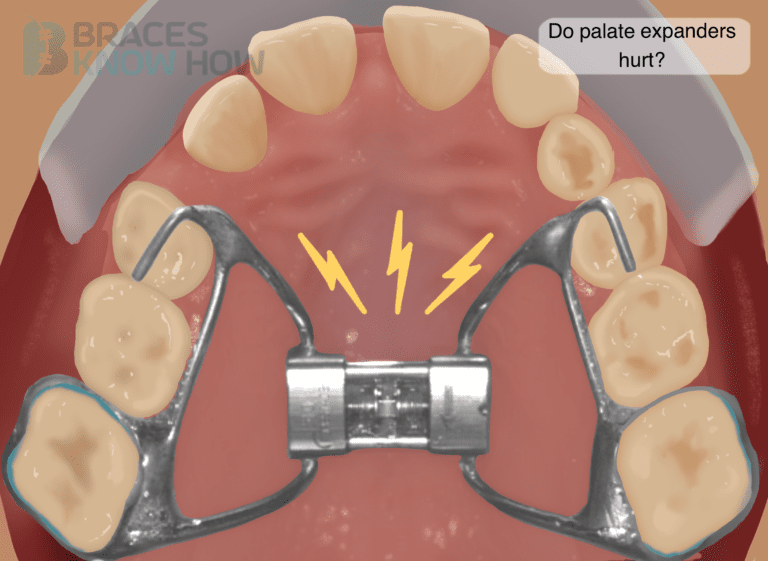
Take your time when chewing your food. Chew slowly and thoroughly to ensure that the food is properly broken down before swallowing. This will make it easier for your expander to handle the food and reduce the risk of any discomfort.
3. Avoid hard and sticky foods
Hard and sticky foods can be difficult to chew with an expander and may cause discomfort. It’s best to avoid these types of foods while you have an expander. Instead, opt for softer foods that are easier to chew.
4. Cut up food into smaller pieces
If you’re having trouble chewing certain foods, try cutting them up into smaller, more manageable pieces. This will make it easier for your expander to handle the food and reduce any discomfort or strain.
5. Use both sides of your mouth
When chewing with an expander, try to distribute the pressure evenly by using both sides of your mouth. This will help prevent any unnecessary strain on the expander and make chewing more comfortable.
6. Avoid excessive force
Avoid applying excessive force when chewing with an expander. Instead, focus on using a gentle chewing motion to reduce any discomfort or strain on the expander.
Managing Discomfort
When wearing an expander, it is common to experience some discomfort, especially during the initial days or after adjustments. However, there are several strategies you can use to manage this discomfort and make the process more bearable.
1. Over-the-counter pain relievers
If you are experiencing mild to moderate discomfort, over-the-counter pain relievers such as ibuprofen or acetaminophen can provide temporary relief. Make sure to follow the recommended dosage and consult with your orthodontist if the pain persists or worsens.
2. Cold compress

Applying a cold compress to the outside of your mouth can help reduce swelling and numb the area, providing relief from discomfort. You can use a cold pack or simply wrap ice cubes in a thin cloth before applying it to the affected area. Remember to take breaks between applications to avoid damaging your skin.
3. Soft foods
Choosing soft foods that are easy to chew can help alleviate discomfort while eating. Opt for foods such as mashed potatoes, soups, yogurt, smoothies, and scrambled eggs. Avoid hard, sticky, or crunchy foods that can put additional pressure on the expander and cause more discomfort.
4. Saltwater rinses
Rinsing your mouth with warm saltwater can help soothe any irritation or soreness caused by the expander. Dissolve half a teaspoon of salt in a glass of warm water and swish the solution around your mouth for about 30 seconds before spitting it out. Repeat this a few times a day or as needed.
5. Orthodontic wax
If the expander is causing irritation or sores on the inside of your mouth, applying orthodontic wax can provide a protective barrier. Take a small piece of wax, roll it into a ball, and place it over the areas that are rubbing against the expander. This will help reduce friction and alleviate discomfort.
Maintaining Oral Hygiene
![]()
Maintaining good oral hygiene is crucial when you have an expander. The expander can make it more challenging to clean your teeth and gums properly, but with the right techniques and tools, you can keep your mouth healthy throughout the treatment process.
Here are some tips for maintaining oral hygiene with an expander:
1. Brushing:
Brush your teeth at least twice a day, using a soft-bristled toothbrush. Pay extra attention to the areas around the expander, making sure to clean thoroughly. Use gentle, circular motions to remove plaque and food particles.
2. Flossing:
Flossing can be a bit tricky with an expander, but it’s essential to remove plaque and debris from between your teeth. Use a floss threader or orthodontic floss to navigate around the expander and between the teeth. Be gentle to avoid damaging the expander or your gums.
3. Mouthwash:
Using an antimicrobial mouthwash can help kill bacteria and reduce the risk of infection. Swish the mouthwash around your mouth for about 30 seconds, making sure to reach all areas, including the expander. Spit it out and avoid rinsing with water afterward to allow the mouthwash to continue working.
4. Waterpik:
A waterpik or oral irrigator can be a useful tool for cleaning around the expander. It uses a stream of water to remove plaque and food particles from hard-to-reach areas. Aim the water jet between your teeth and around the expander, being careful not to use too much pressure.
5. Regular dental visits:
Keep up with your regular dental check-ups and cleanings. Your dentist or orthodontist will be able to monitor your oral health and make any necessary adjustments to your treatment plan. They can also provide professional cleanings to remove any stubborn plaque or tartar.
Remember, maintaining good oral hygiene is essential for the success of your orthodontic treatment. By following these tips and seeking professional advice when needed, you can keep your mouth healthy and ensure the best possible outcome for your expander treatment.
Seeking Professional Advice
It’s especially important to seek professional advice if you experience severe discomfort or pain while eating with your expander. Your orthodontist or dentist can assess the situation and make any necessary adjustments to ensure your comfort.
Additionally, if you have any concerns about your expander or its impact on your oral health, it’s best to consult with a professional. They can address any issues or answer any questions you may have, providing you with the guidance and support you need throughout your treatment.
Remember, your orthodontist or dentist is there to help you achieve the best possible results from your expander treatment. By seeking their professional advice, you can ensure that you are taking the right steps to maintain your oral health and successfully navigate the challenges of eating with an expander.

Dr. Fidel Cann: Esteemed orthodontist with a lifelong dedication to enhancing smiles and oral health. Pioneering expertise, compassionate care.
